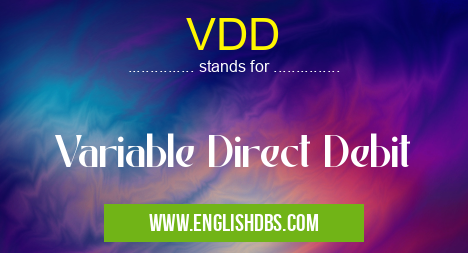What does VDD mean in UNCLASSIFIED
VDD stands for Variable Direct Debit. It is a type of direct debit that allows businesses to automatically collect payments from customers on a variable basis, depending on the amount of goods or services used. This method of payment is commonly used in situations where the amount due varies from month to month, such as utility bills or subscription services.

VDD meaning in Unclassified in Miscellaneous
VDD mostly used in an acronym Unclassified in Category Miscellaneous that means Variable Direct Debit
Shorthand: VDD,
Full Form: Variable Direct Debit
For more information of "Variable Direct Debit", see the section below.
How VDD Works
When a customer signs up for a VDD, they authorize the business to collect payments directly from their bank account. The business will then set up a schedule for the payments, which can be monthly, quarterly, or on any other agreed-upon basis. The amount of each payment will be based on the customer's usage or consumption of the goods or services being provided.
Advantages of VDD
- Convenience: VDD provides convenience for both businesses and customers. Businesses can save time and resources by automating the payment collection process, while customers don't have to worry about missing payments or incurring late fees.
- Flexibility: VDD allows businesses to collect variable amounts, making it a suitable option for services where usage varies.
- Reduced Payment Disputes: By automating the payment process, VDD reduces the risk of payment disputes, as customers are aware of the payment schedule and the amount due.
- Increased Cash Flow: VDD can help businesses improve their cash flow by ensuring timely and regular payments from customers.
Essential Questions and Answers on Variable Direct Debit in "MISCELLANEOUS»UNFILED"
What is Variable Direct Debit (VDD)?
VDD, or Variable Direct Debit, is an automated payment method that allows you to pay variable amounts from your bank account towards a specific bill or service. It eliminates the need for manual payment processing and ensures timely payments.
How does VDD work?
With VDD, you authorize a service provider to debit your account for an agreed-upon amount. The amount is typically determined based on the usage or consumption of a service, such as utilities, subscriptions, or membership fees.
What are the advantages of using VDD?
VDD offers several advantages, including:
- Convenience: Automates payments, eliminating the need for manual processing and paper checks.
- Time-saving: No need to remember due dates or spend time physically making payments.
- Reduced late fees: Timely payments prevent penalties or additional charges due to late payments.
- Improved budgeting: VDD helps track expenses and ensures payment alignment with actual usage.
Is VDD secure?
VDD transactions are typically processed through secure payment gateways and follow industry-standard protocols. However, it's important to ensure that the service provider is reputable and follows proper security measures to protect your financial information.
Can I cancel a VDD payment?
Yes, you can cancel a VDD payment by contacting the service provider or your bank. However, there may be specific procedures or deadlines for cancellation, so it's crucial to check with the provider's terms and conditions.
Final Words: VDD is a valuable payment option for businesses that need to collect variable amounts from customers. By automating the payment process and providing flexibility, VDD offers both convenience and efficiency. It can help businesses streamline their operations, reduce payment disputes, and improve their cash flow.
